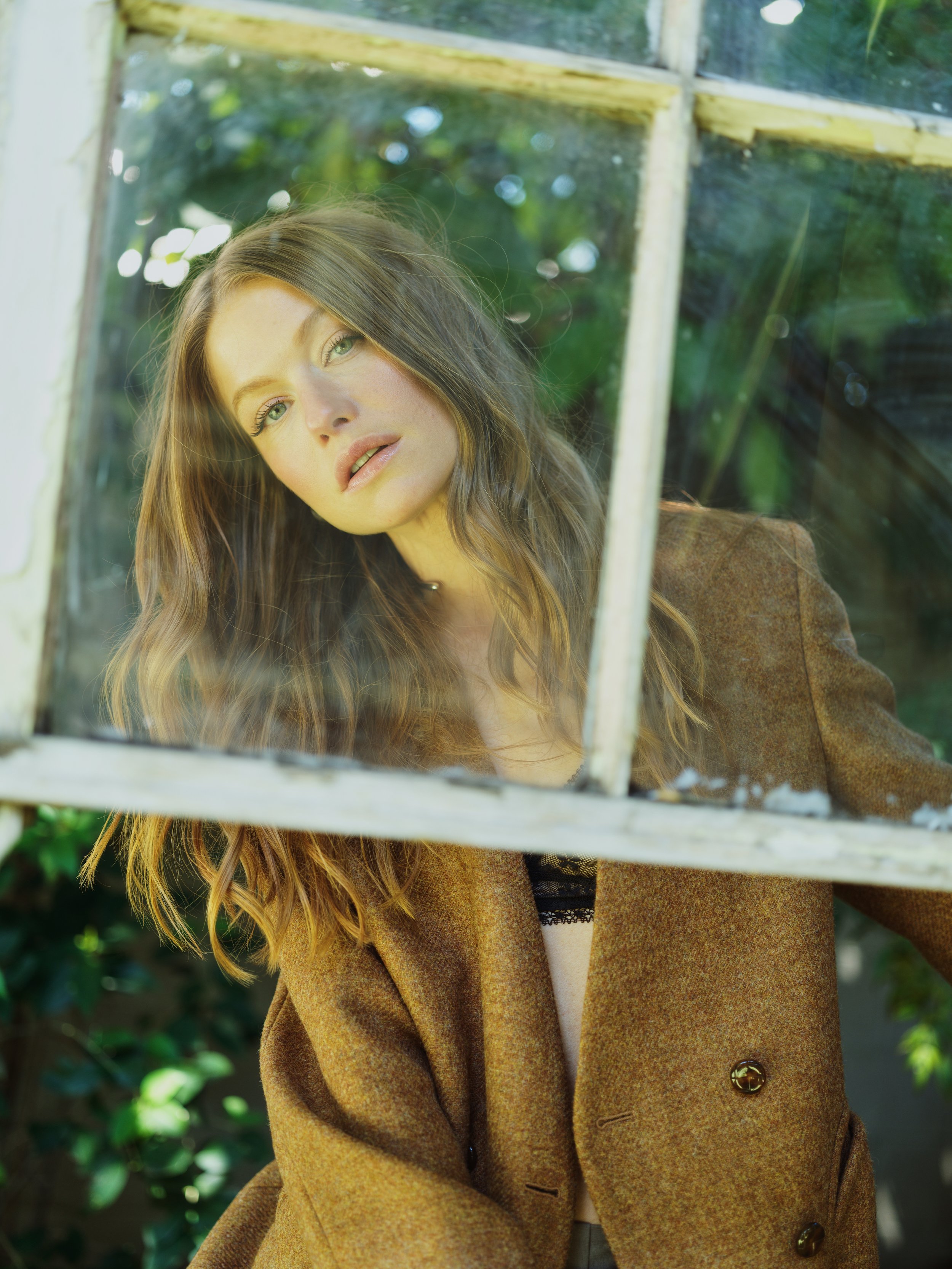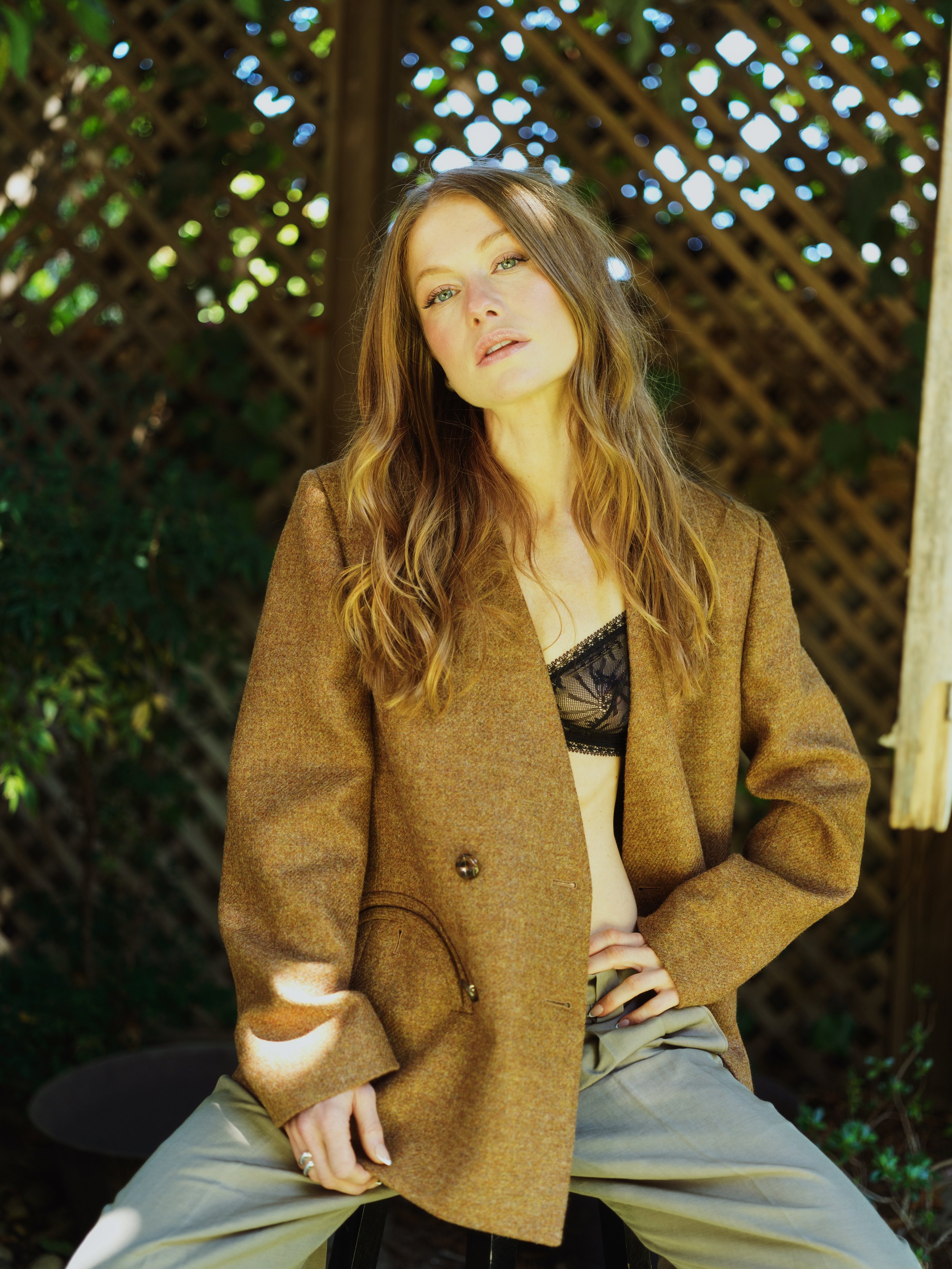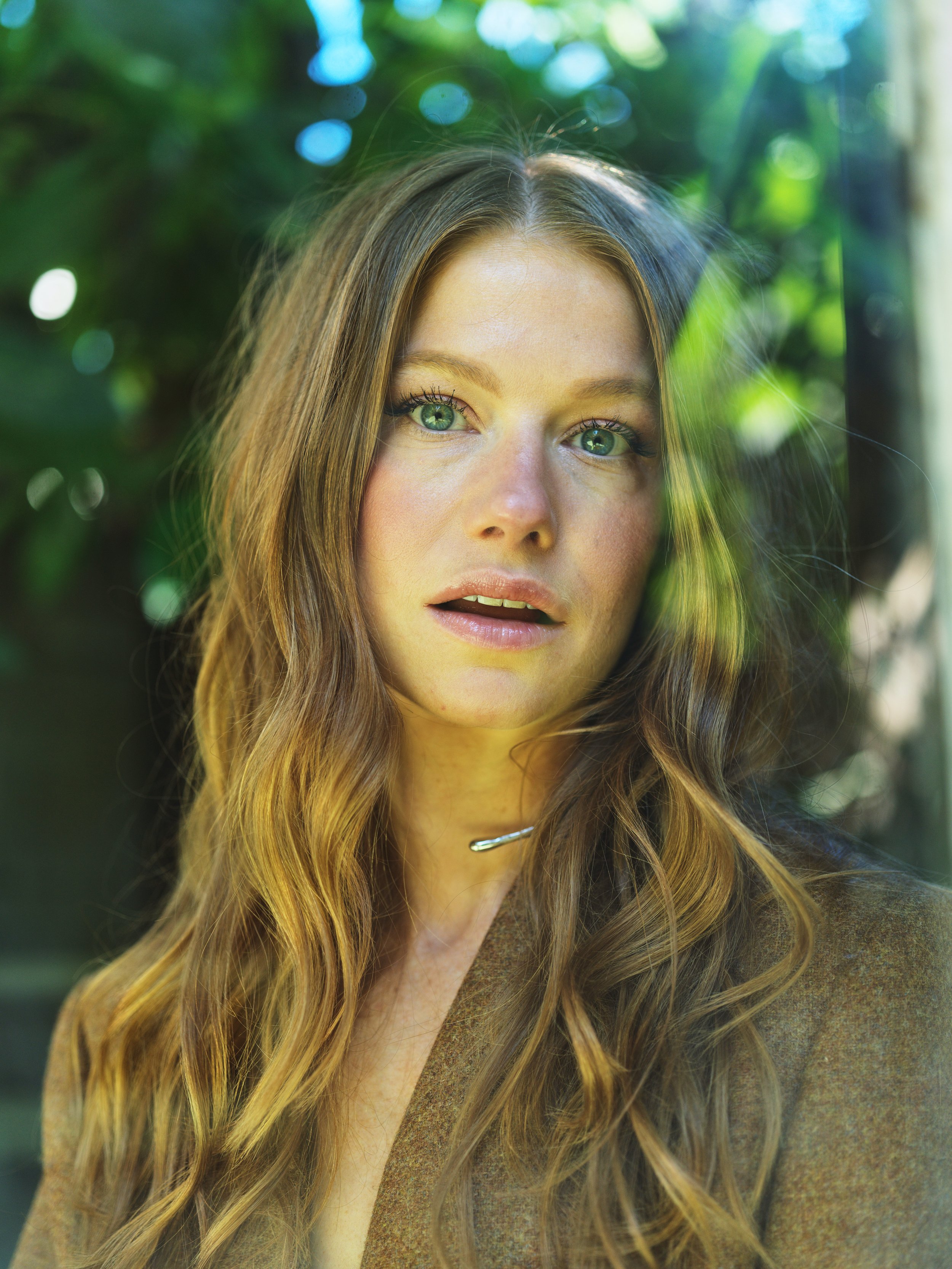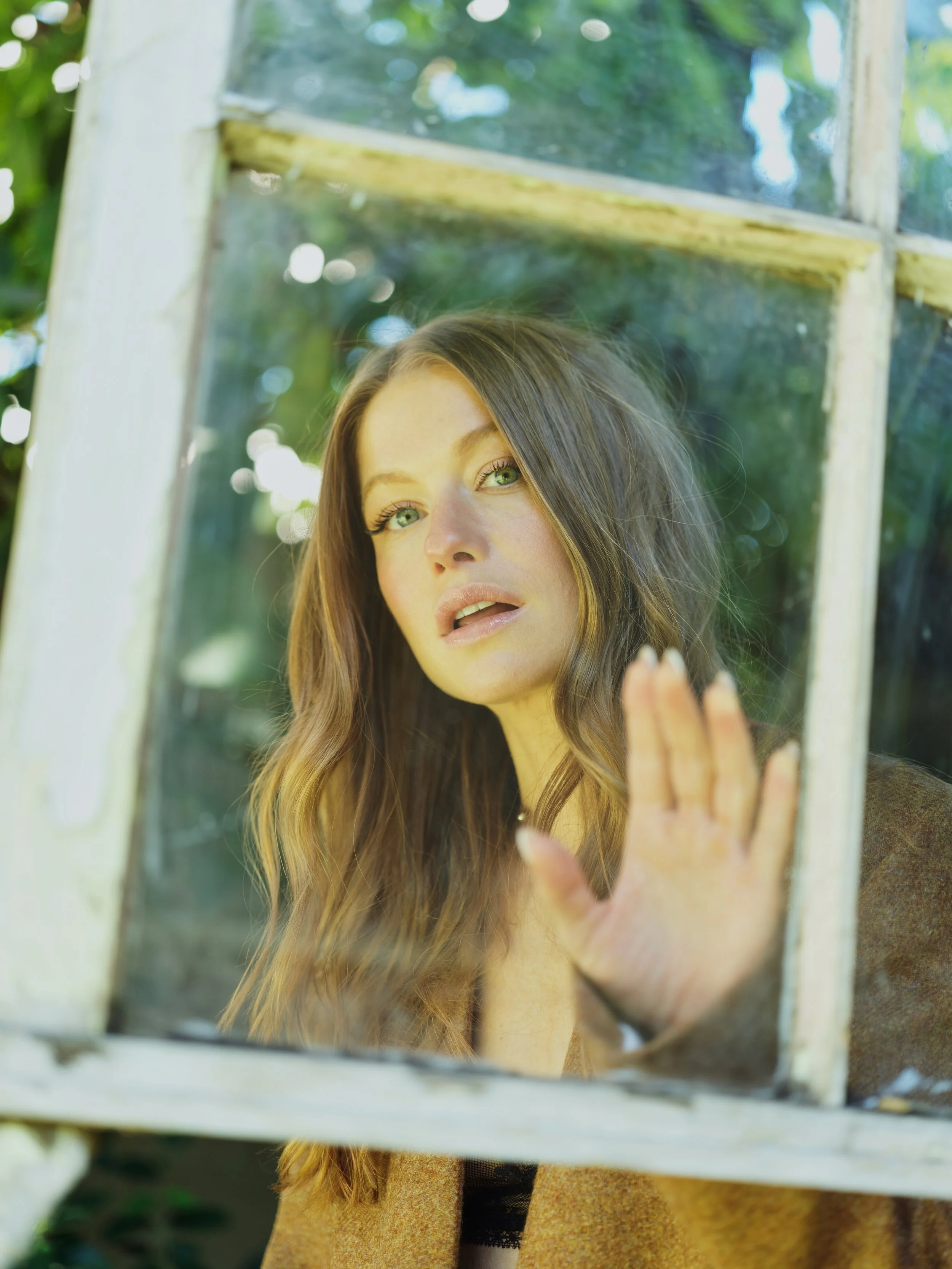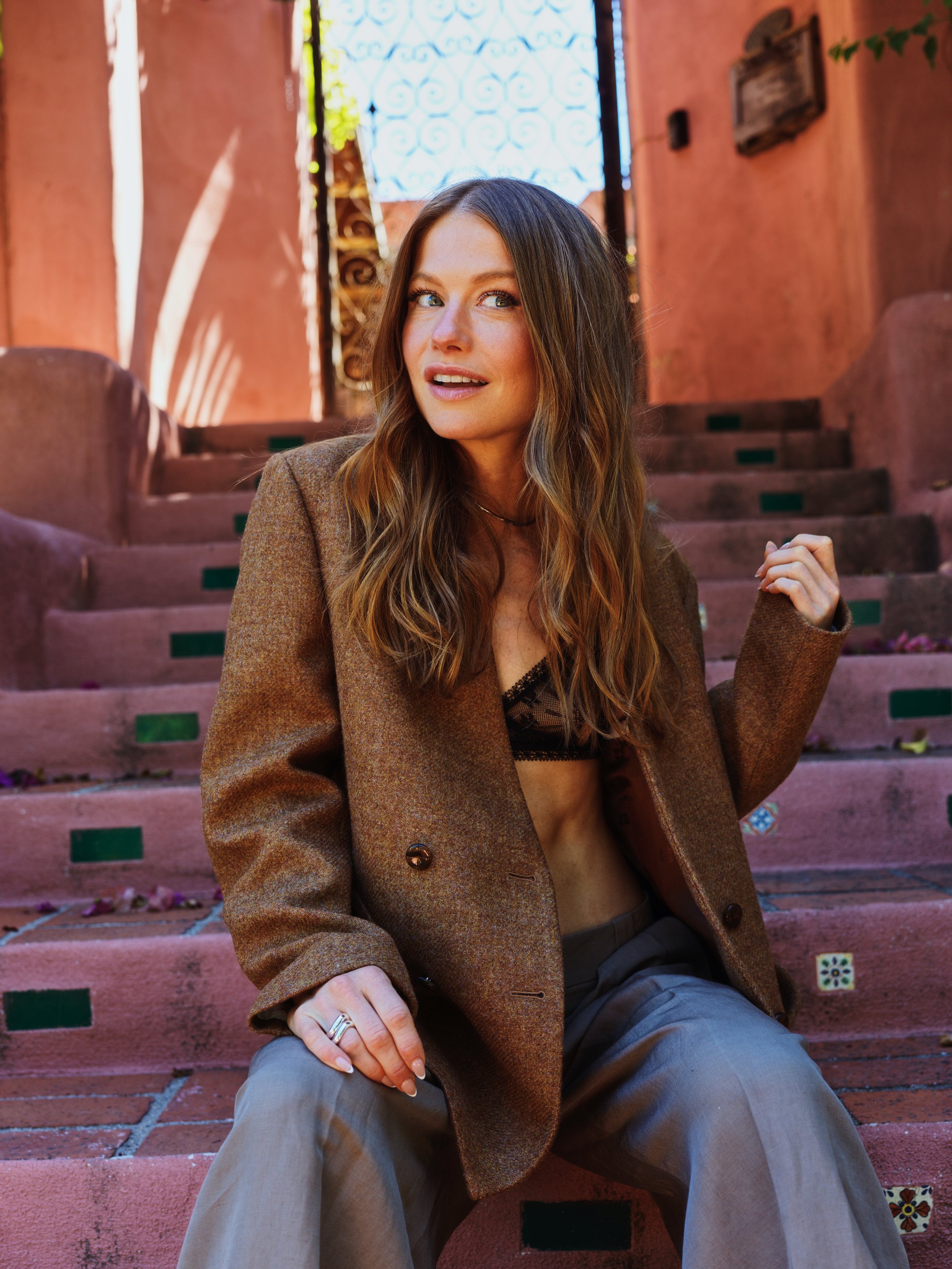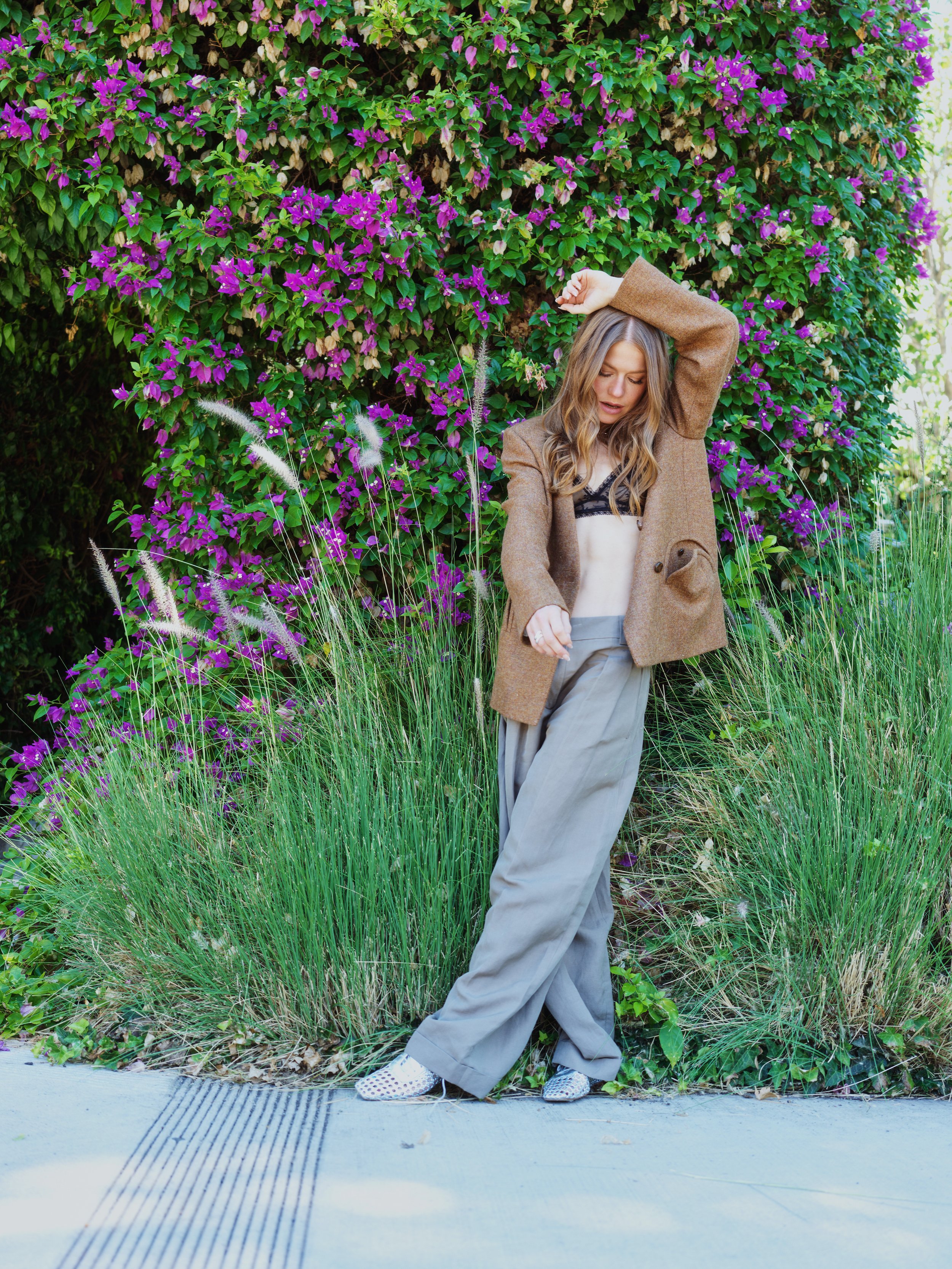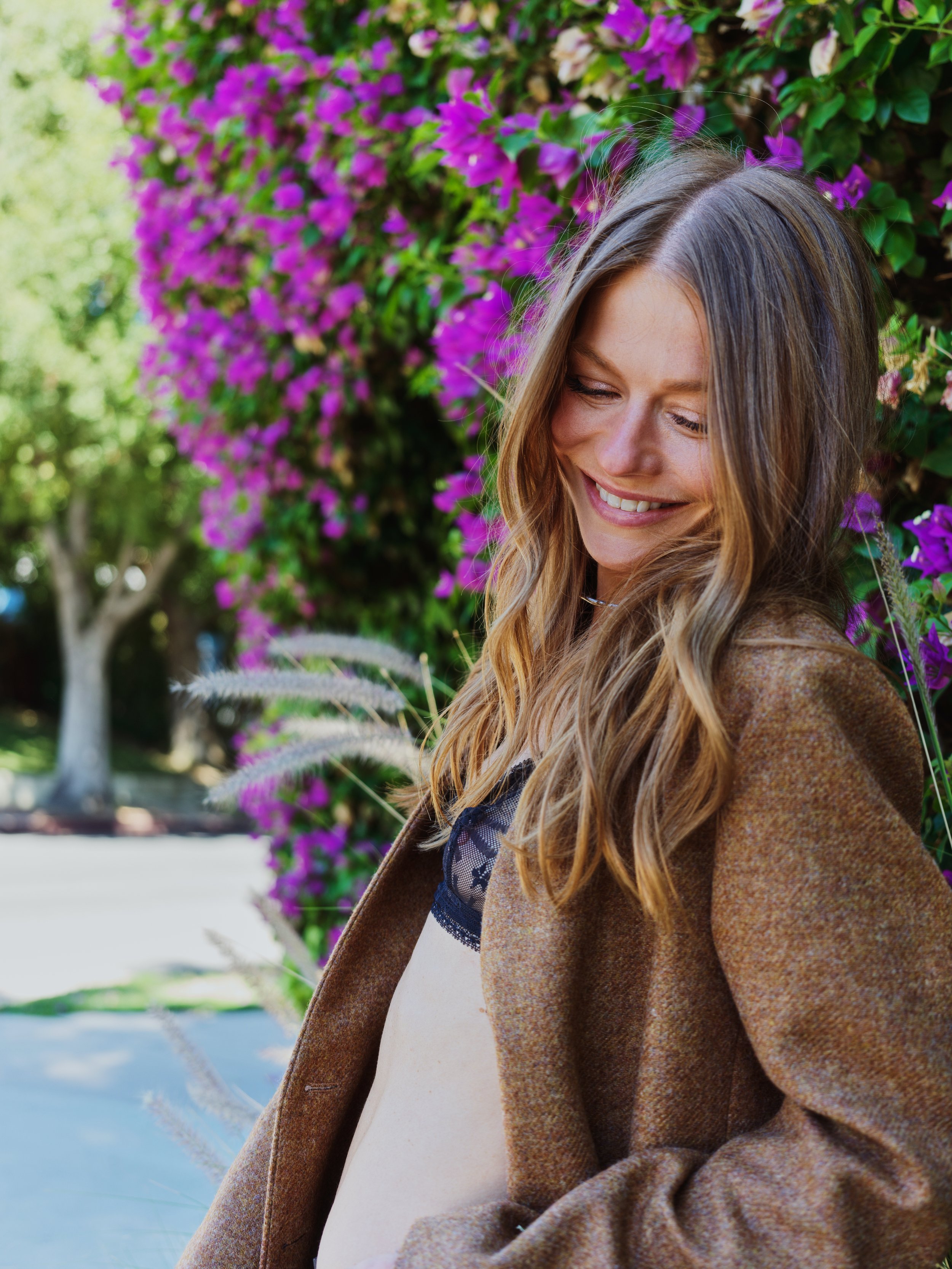Genevieve Angelson
“The Chicken Sisters” star discusses the highs and lows of Hollywood.
By Lindzi Scharf
"Can I, for starters, apologize by saying, I am so brain dead right now," Genevieve Angelson exclaims, taking a seat on a brown couch, covered in white dog hair, inside my modest Los Angeles home. "I feel like I might say something stupid," she adds. "Or, even worse, boring."
"It's a pressure-free zone," I tell her, although – ironically – I'm feeling insecure about the dog hair. (Shedding is my two Chihuahuas' love language. As is barking, which is why I've sent them to a groomer for the day.) As laid back as you want every interview to feel, there's always initial awkwardness as both parties attempt to build trust while navigating personal boundaries. Recorder in hand, I jokingly tell her, "Pretend you're at your therapist's office."
With that, Angelson kicks up her Andrea Gomez oxford-clad feet.
She's game to role-play. She is an actress after all.
She lays across the couch. Oblivious to the fur. Or, perhaps, politely ignoring my half-baked attempt at tidying up before our publicist-arranged meet-cute.
It makes sense that Angelson is feeling drained. She's in from out of town and on her last leg of promotion after several days of press for "The Chicken Sisters," the tentpole series from The Hallmark Channel's new streaming service Hallmark+. Because Angelson spent the week at her friend's place, I'd invited her over to my humble abode for a cup of coffee, conversation, and – as it turns out – interior design inspo.
"We're looking at tables just like this – me and my boyfriend," Angelson says, upon spotting a tree trunk coffee table that once belonged to my maternal grandmother. Having lived between Los Angeles and New York for over a decade, Angelson explains that she's finally putting down roots on the East Coast: "I've just now moved to New York for love."
Personally, the moment is a turning point for Angelson, but professionally, she's been killing it for years. In addition to memorable roles in "The Handmaid's Tale," "This Is Us," "Good Girls Revolt," "The Afterparty," and "New Amsterdam," Angelson is also known for writing deeply intimate personal essays for Elle, Refinery29, and Town & Country. No surprise, I soon discover she's as authentic and raw in person as she is in her essays.
"I mean, if we're going to go here, let's really go here…" Angelson says while reflecting on her college years at Wesleyan University in Connecticut. "When I think back to Wesleyan, I think about a person who was an inevitable expression of rock and roll. For better and worse. [I was] absolutely the most fun person and absolutely self-destructive. Better to learn how many cigarettes are too many cigarettes when you're 19 than when you're 29, you know what I mean?"
Angelson's initial concerns are unwarranted as it becomes clear…
This conversation will be anything but boring.
GROWING UP
Born in New York City, Angelson moved to London, where she spent her early childhood. "My parents are not Brits, but my dad was opening an international office," she says, explaining her father was a prominent lawyer and businessman. "He was the guy they sent over there."
At ten, Angelson's family returned to Manhattan, where she attended The Brearley School. "I was thrown into this world that felt hostile," she says. "I went to an all-girls private school, and it was not at all what I had been used to. I quickly elucidated that I was not ever going to be or feel like one of the cool girls who wore the right clothes, came from old money, and knew how to ride a horse." She laughs. "I was a clown person."
She remembers, "We used to have non-uniform days where you could wear your own clothes from home. I interpreted those as being [like] Halloween and would come fully in costume. One time, I actually did come as a clown when everyone else was wearing their competitive name-brand blue jeans and being chic. As a ten-year-old, I was like, 'I think today is the day that I will spray black streaks in my hair.'"
As a kid, the entertainment industry wasn't on Angelson's radar. "I didn't have much of an impression of Hollywood or of Broadway," she says. "The [people] who were most important to me growing up were my sisters, [Jessica and Meredith]. Just being included by them and admiring them [was my focus]. To this day, they're still my heroes."
Angelson says she grew up attending theatre camp and doing school plays but didn't realize it could be a profession. "I didn't think I would be allowed to be [an actor]," she reflects. "Also, I'm sure I didn't think I was any good at it."
By her late teens, she decided she wanted to attend acting school, but her parents had other plans. She remembers, "I went to them at 17 and said, 'I know where I want to go to college. It's Juilliard.' They said, 'No.'"
THE COLLEGE YEARS
It's a decision Angelson appreciates in hindsight. "I was encouraged [to go to college] by good parents who wanted me to be happy and secure in my life," she says. "[They wanted me] to do literally anything else other than this. [They] gave me a great education. Their thing was, 'If you want to be an actor, you have to go to regular college and be a person first, and if you discover that it's still a thing that you want to do, then we can talk about graduate school.'"
"I am so lucky that I had people who encouraged me to go to Wesleyan," she adds, "[to] study film and watch two movies at least every day for four years and take science classes and study governments."
Like most college students experience, it proved to be a time of serious self-discovery. "Your college years are before your Saturn return," she says. "I'm a complete armchair astrologist; so I don't know if I'm describing this accurately, but my definition of Saturn return is that you're confronted with the coping mechanisms that are no longer serving you. You can let go or be dragged. It's at that point in your life where you have to pivot into the person who can carry themselves through the world in a way that is aligned with her values or not aligned with her values."
She continues, "I would say that college was pre-Saturn return. On the one hand, I was having the time of my life at the right school for me, discovering cinema, falling deeply in love with filmmaking and filmmakers, and writing about movies in a way that inspired a deep passion for me. If I hadn't become an actor my dream was to be Manohla Dargis and to be the New York Times film critic. However, I was also a person who had a deep vulnerability, an excess of temperament, an incredible amount of empathy and intuition, and a bad set of tools and narratives, and self-definitions. I took study drugs to get A's because I thought that was the thing that I absolutely [needed to] do to be loved. I drank too much. I didn't know my worth. I gaslit myself."
After college, Angelson realized she still needed to scratch that original itch. "I had this instinct that there would be a part of me that always felt like I'd sold myself short if I didn't at least try [to pursue acting]," she reflects. "I remember I had an incredible teacher who discouraged me from applying to grad school because he said, 'You'll spend your ingénue years inside. Why would you not want to start working as soon as possible?' My answer to that was, 'I want to be doing plays at Lincoln Center when I'm in my sixties, and I won't know how to do that if I don't get training.'"
THE LAST DECADE
Despite her undergrad teacher's advice, Angelson enlisted in New York University's Tisch School of the Arts's Graduate Acting Program. "I took this non–ageist leap of faith on myself," she says, "which is a thing that I continue to do to this day, whether it's in being honest about my age or putting forward the parts of myself that are not attached to the way that I look. Or even taking a leap of faith at age 36.75 that I'm not in the right relationship, and I deserve to be happier even if I think that that's a thing that I'm supposed to have figured out by that point. It's always rewarded me to not subscribe to that narrative."
After graduate school, Angelson's instincts served her well as she landed her first Broadway show opposite Sigourney Weaver and David Hyde Pierce in Christopher Durang's "Vanya and Sonia and Masha and Spike," which won a Tony Award in 2013. From there, she booked parts on various television series including 2013's "The Good Wife" and 2014's "House of Lies" with Don Cheadle, the latter of which led her to relocate to Los Angeles.
Angelson says her NYU degree gave her a sense of comfort when auditioning. "When you graduate from one of these grad schools, you realize, 'I might have an audition and not know what to do with it, but nobody else has been given more tools,'" she says. "'So if I don't know how to do it, that's okay, because no one knows how to do it.'"
By 2015, Angelson landed her first series regular job on the Fox comedy "Backstrom," which, she says, further boosted her confidence. "I went into an audition with Rainn Wilson," she remembers. "I saw in him another guy who'd gone to NYU grad acting, and I treated him like a peer. The two of us sparred like equals. That's when I knew that I had the chops."
She's taken lessons from that time to heart. "At some point, I realized it doesn't matter how good I am at this," she says. "If I walk into any audition room with the embodiment of, 'Hello, I'm here. You're welcome. You can send everyone else home now,' that is ultimately the thing that will inspire the confidence of the people who want to give you a job. You don't want to hire an electrician who is like, 'I'm so sorry. Another electrician might have been more prepared with these wires,' you know?"
Over the last decade, Angelson has split time between New York City and Los Angeles as a result of work. "Since 2013, I have spent, consistently, for different reasons, six months of the year in L.A. and six months in New York," she says. "But, I think there is an energetic part of that, too. Not only do I feel like there are parts of me that need nourishment by the qualities of both cities, which are quite distinct, but I also feel like part of my assignment as an artist, as a writer, and as a soul is to take those qualities about Los Angeles that New Yorkers might turn their noses up at or find woo-woo and stupid and put them in the body and the language of a New Yorker."
She further explains, "That [way] I can communicate things having to do with somatic healing or astrology or plant medicine or things that are embraced by Angelenos like they are [The] Torah and package those healing modalities for New Yorkers in a more palatable way. Or, for instance, bring those worldly tapped-in activist qualities that might belong more indigenously to New Yorkers to the laid-back, less involved qualities of the Angeleno who might otherwise feel like they can check out and not participate in the world and its betterment. In New York, it's my assignment to make things like breath work and feeling your feelings, a thing that a New Yorker can wrap their mind around as being important. And in L.A., I need people to read the New York Times. I take it as my duty to be the person who can, like a spy, slip in and carry the message."
WRITING HER WAY OUT
That same curious and earnest nature led Angelson to explore writing. "My first essay probably came out sometime around 'Good Girls Revolt,'" she says, referencing the 2015 cult-favorite drama set in the sixties, in which she played an aspiring journalist held back by societal circumstances. While the show was short-lived, it made its mark on audiences as well as on Angelson, who'd long had an interest in writing as a form of expression. "[My first essay] was pretty lighthearted," she says. "It was about why I like approaching fitness [differently]. It was not particularly deep and yet at the same time it was the gateway drug to writing things that were a lot more deep and a lot more revealing."
From there, Angelson wrote about everything from navigating an eating disorder to freezing her eggs.
"The thing that draws me to writing is not unlike the thing that drew me to acting, which is that for me, it has never been about attention," she says. "The part of me that gets most satisfied by both modalities is the [healing nature of it]. I've always been obsessed with the truth, with authenticity, and with effective remedies for loneliness and shame."
"When I think back to me at Wesleyan," she says, "I can see myself picking up ineffective remedies for loneliness and shame, which is to say when you bury a feeling, you bury it alive. For me, [it's been impactful] writing about experiences I've had that have made me feel not proud of myself, [like] agreeing to have sex with a boss, which is something that I wrote about during Me Too. [It] was something that I had not seen people writing about. I'd heard all of these stories of women running out of hotel rooms and escaping their predators, and I had not yet heard about the nervous system reaction, which is to go along to get along."
Angelson continues, "I had an enormous amount of shame about that – only to realize after writing about it, that it is in fact, a survival tactic. There is a part of me that weighs, 'Am I sharing a thing that is going to touch and awaken some part of another person's humanity that will help them to turn more warmth on themselves?' Or, 'Is this a lack of boundaries?'"
Beyond facing her insecurities, Angelson says her essays are intended to serve a greater purpose. "I've always felt incredibly compelled by inspiring or encouraging people to put larger and larger arms around themselves and those parts of themselves that they have designated unacceptable," she says. "Or [the idea], 'If anyone were to know about this or this all of the love would go away.' I just think there is an extremely good reason that every part of us is a part of us."
She also wrote pieces during the pandemic as well as during the Screen Actor's Guild strike. "During the actor's strike, I knew there were going to be other people who were going to write about it in a way that was more broadly and specifically grounded in the labor history, in the deal points," she says. "What I wanted to write about and did was, 'Why this is important,' and the deeply ingrained feeling that it's shameful to be an actor; that we're lucky to be here; that we're easily replaceable; and that for having chosen this [profession] we kind of suck."
Angelson adds, "'Actors just kind of suck' is a thing that not only is widely disseminated but a thing that actors have come to believe about themselves, and the economic implications for that are ones that, for me, came up deeply during the SAG strike. [It's plentiful] the things that I've settled for that are not right; that are not practiced in other industries or other art forms."
While Angelson enjoys writing for women's magazines, that's not to say she aspires to be a journalist like her "Good Girls Revolt" character. "I'm never going to be interested in writing the most thoroughly researched journalistic piece," she explains. "For me, the most salient facts are the experiences of the heart."
CREATING BALANCE
In addition to a love of writing, Angelson discovered somatic therapy as a form of healing during the pandemic. "It wasn't possible not to be confronted with yourself," she remembers. "On day four of being trapped inside, I was struggling with my own compulsive need to be productive and my merit-based distortion around thinking that I need to achieve things to be worth loving. I feel like that was part of what COVID heated up for me."
After benefiting from somatic healing as a student, Angelson decided to become certified as a therapist herself. "I studied under my somatic therapist," she shares. "My hunch was, 'I think it'll make me a better actor if I can get that deeply into my own body and put my arms around the things that would otherwise make me want to dissociate or that I've deemed too unsafe to feel.' I did it to become a better artist. But in doing it, what I found was, 'This is why I became an actor to begin with; to be able to hold space for the human condition through whatever modality.' Ultimately I did it for me and whatever way that expresses itself whether it be in acting or writing or in being a good friend."
As a result of her training, Angelson says she's more in touch with her body and her instincts. "It's made me less verbal," she says. "I think I was writing more before I went through that level of training because I found that the more I am willing to be still and be with physical sensation, the more I realized that talking and thinking is…" She pauses. "Less true." In the last year, she says, she's learned, "My body is always right. If I have an instinct or an intuition about something, it's right."
THE CHICKEN SISTERS
Angelson is keeping busy these days with her latest television series, "The Chicken Sisters" on Hallmark+. "The same casting director that gave me ["House of Lies"], which was my first job in L.A., gave me 'The Chicken Sisters,'" she explains. "Felicia Fasano has been such an incredible godmother to me."
Based on a New York Times bestselling book by K.J. Dell Antonia, "The Chicken Sisters" follows two competing chicken restaurants in the south that have a generational feud. Angelson says the show's themes run much deeper than its lighthearted synopsis. "It's about shame," she says. "It's about coping mechanisms. It's about being in fight or flight."
Angelson says she was blown away when she saw the show's finished product. "The first time that I watched the pilot, I was like, 'Oh, my God, it's an eighties movie,'" she says. "It has all of these aspirational, completely, fictional feelings of what America could be like, but isn't. But you can still identify it as being real. The way that you watch 'Ferris Bueller' and you're like, 'I know that that's not my high school, but I believe that it was high school at some point for someone. Maybe. Or I want to believe that.'"
"Chicken Sisters" co-stars Schuyler Fisk, Lea Thompson, and Wendie Malick, and it features a slew of all-star behind-the-scenes talent from "Schitt's Creek," "Younger, and "Shrinking," which greatly appealed to Angelson.
"The reason that I agreed to do it in the first place was because [of] the creatives attached," she says. "These are the shows that I love making and watching and being a part of. That's the club you want to be in, you know?"
ROLE-PLAYING
Over the years, Angelson has performed a wide range of roles, but she's quick to point out that she wouldn't refer to herself as a chameleon. "I don't necessarily know that I've ever really transformed," she admits. "Every character I've ever played is just a part of Genevieve. It's not because I have multiple personalities. It's because I think that humanity is limitless, and the safer we make it for these different elements of ourselves and the more empathy we can have for people in completely unsympathetic situations, the more we realize that I'm never playing someone who's not me."
She laughs.
"I say that fully aware that I played one of the evilest people on television on 'The Handmaid's Tale,'" Angelson says, referencing the character, Alanis Wheeler. "I will say… I did a lot of work trying to figure out why a person like her would act the way that she did. I could never have played, quote, unquote, the villain. There would be no humanity in that for me."
While Angelson has had the good fortune of steady work since she entered the business, that's not to say she hasn't questioned her career path along the way. "It's constantly a question I ask myself," she admits. "It's a horrible profession. I am constantly considering other jobs. I'm constantly asking myself, 'This? Forever?' And listen, I'm perfectly aware of what that sounds like. I have had the benefit of supporting myself as an actor for my entire career. That [puts] me in the top 1% of people in this profession. That being said, to the person who would argue, 'There is nothing about your career to complain about. You're living your dream. Boo hoo. Most of us have to wait tables or many of us, even as our main profession, are doing something we don't want to do because being a grown-up means paying your bills.'" She acknowledges, "[You're] heard."
Even so, Angelson feels it's important for aspiring actors to understand what they're signing up for. "The inside of this job – even at the top, even when you're at the height of your game – involves having no control over where you shoot [and] how long you spend away from your significant other," she says. "The hours are bonkers. I, often, on 'Chicken Sisters' was waking up at four o'clock in the morning and working for twenty-one hours."
She also stresses that it's imperative to realize actors spend their careers proving themselves time and again. "You want to believe that by getting to a certain point in your career, you don't have to do that anymore," she says. "And that's just not true of actors. Particularly not now, particularly post-strikes and post-COVID. It's why I felt so utterly blessed to be offered 'Chicken Sisters' because a lot of people are not working. And people who 10 years ago would never, ever have considered auditioning for something are making self-tapes all the time."
She also says the audition process can take a lot out of actors. "I regularly work many hours a day for free in the form of the audition," she says. "There's an Instagram account called Auditions Are Work, which is a movement. My boyfriend is a designer. He wouldn't possibly put together a proposal if he wasn't getting paid to do it. I work, sometimes, 30 hours on creating a performance that I will then find out that they just made an offer to another actor for and didn't even watch the tapes. But because it's a tenant of my industry, it's a thing that I do, and we all feel so lucky to work that we disrespect ourselves."
THE POWER OF NOW (& WHAT’S NEXT)
Angelson's aspirations are endless, but she says her ultimate goal is to embrace every given moment. "One thing [I'm focused on] right now is presence," she says. "Not feeling like I have to control my path. Trusting the flow of what is coming to me and that what I want is wanting me back. Not feeling like everything has to happen before the age of dot/dot/dot. [I'm] surrendering narratives around the timing."
She's focused on enjoying the journey. "I want to keep doing what I've had the gift of being able to do," she says. "There are people who have more Instagram followers than I do. There are people who are more famous than I am, but I admire the career of Genevieve Angelson."
She continues, "Show me the person who can go from being on a gross-out bro comedy by Lord-Miller called 'The Afterparty' on Apple and playing a clown of her own creation to being on 'The Handmaid's Tale; being on 'Chicken Sisters' to playing the hippie in 'Good Girls Revolt' or playing a Gwyneth Paltrow [type of] doctor on 'New Amsterdam.' The thing that I did right before 'Chicken Sisters' was a play with Matthew Broderick [called 'Babbitt' at La Jolla Playhouse]. I feel incredibly proud of the fact that by being specific and authentic and true to each opportunity as it has put itself in front of me, rather than being lovable in my persona, I've had a chance to be a real journeyman actor who no one has ever put into a box as opposed to a star, which I think can come with its own [challenges and trappings]."
Angelson says she's also recently learned to get out of her own way and let fate take the wheel. "The truth of the matter is, if I look really honestly at the utter improbability to have the career that I've had—to have any career as an actor, to have anything published—I have had nothing in this life but support and green lights and encouragement from everyone except myself," she says. "All of the resistance and all of the things I have had to overcome have been stories and false beliefs and limiting beliefs that I have generated from my own fear, from my own shame, and from my own disempowerment. I'm not saying it came from nowhere. Those were things that were embedded in me at some point. But the thing that's always been the most in my way is me."
Owning the messy truth is a step in the right direction. "Getting older, for me, has been a ceaseless appetite for getting out of my way," Angelson says, "and an utter refusal to settle for less than constant growth, constant expansion, more joy, more play, more possibility. That is my life's work."


